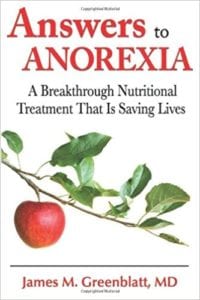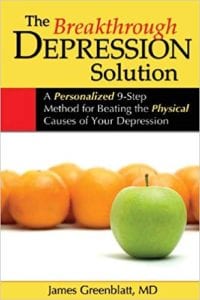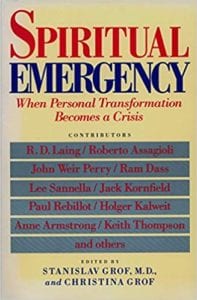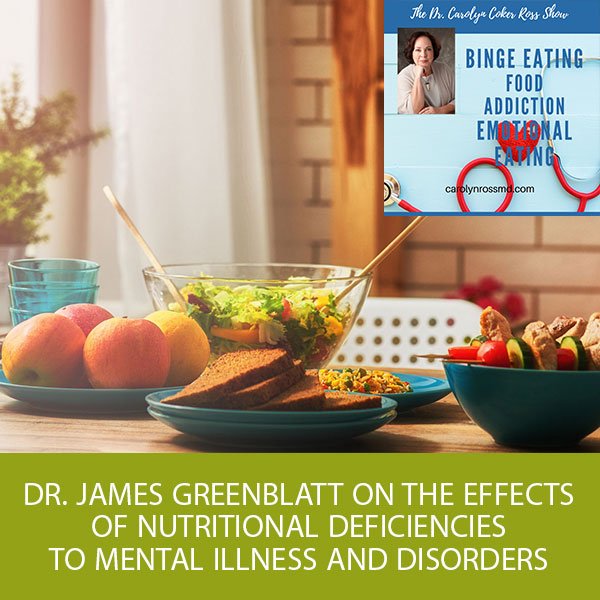
There has been a lot of frustration among clinicians and even patients about the effectiveness of medications as the core treatment approach in psychiatry. In fact, recent research has shown that the medicines for depression and many other disorders are not helping as much as we would have liked or hoped. Dr. James Greenblatt delves deeper into this as he talks about the problems with psychiatry today. He is a certified child and adult psychiatrist, a pioneer in integrative medicine, assistant clinical professor, and author. Dr. Greenblatt provides great insights into the actual underlying causes of disorders that are often missed in psychiatry which often focuses on just treating symptoms. He talks about the relation of nutritional deficiencies and environmental toxins to mental illness and disorders, highlighting how nutritional interventions can make treatment a lot easier.
—
Listen to the podcast here:
Dr. James Greenblatt on The Effects Of Nutritional Deficiencies To Mental Illness And Disorders

Answers to Anorexia: A Breakthrough Nutritional Treatment That Is Saving Lives
Our special guest is Dr. James Greenblatt. He is a dually certified child and adult psychiatrist and is a pioneer in integrative medicine. He’s lectured throughout the United States on the scientific evidence for nutritional interventions in psychiatry and eating disorders. Dr. Greenblatt is the Founder and Medical Director of Comprehensive Psychiatric Resources, an integrative psychiatric practice near Boston. He’s an Assistant Clinical Professor at Tufts Medical School. He has two books, one called Answers To Anorexia and the second is Breakthrough Depression Solution. I want to jump right into it. Can I ask you what’s wrong with psychiatry today?
There’s a lot of frustration among clinicians and certainly our patients. We’ve been misled for a long time as to the effectiveness of the medications that are the core treatment approach that we use in psychiatry. Research has demonstrated that the medicines, particularly for depression and many other disorders, aren’t helping as much as we would’ve liked or hoped. The problem is that we’re not looking at underlying causes, we’re just treating symptoms.
What do you mean when you say we’re not looking at underlying causes? What are some of the things we’re missing?
We’ve disconnected the rest of the body from the brain. Psychiatry, certainly in the treatment of depression, looks at a list of symptoms of the sadness, the sleep appetite, fatigue and lack of motivation. What an integrative psychiatrist does is tries to find many physical causes that may be contributing to those symptoms. It could be hormonal problems, it could be a food allergy, it could be a nutritional deficiency and it could be a host of things that might be contributing. Our psychiatry profession is not looking for any causes. It’s just prescribing a medicine for the list of symptoms

The Breakthrough Depression Solution: A Personalized 9-Step Method for Beating the Physical Causes of Your Depression
In your book on depression, The Breakthrough Depression Solution, talks a little bit about some of these underlying causes such as nutritional deficiencies or environmental toxins. Would you mind explaining a little bit about what nutritional deficiencies we see? How can environmental toxins and what environmental toxins can affect our mental health?
It’s a complicated question because the core of the work that I do and most integrative physicians do is looking at the individual. Ten individuals might present with the depressed mood and there might be ten different causes. Testing is critical. Some of the deficiencies in essential fatty acids, in trace minerals like zinc and magnesium or vitamins. One of the more common ones we’re seeing is in vitamin B12. Those can lead to significant psychiatric symptoms.
I’ve also seen a number of articles on omega three fatty acids and how they can reduce the risk for suicide. In an article, those in the military with suicidal attempts tended to have lower blood levels of omega three fatty acids.
That’s one of the most important articles that I’ve seen in many years because we don’t have tools that look at prevention. There are other studies before that as well that have shown that deficiencies with the essential fatty acids are a high-risk factor for suicide. What’s also not commonly talked about is low cholesterol is also a risk factor for suicide. These two fats which are critical for brain function are scientifically found as risk factors for suicide.
Why aren’t more psychiatrists accessing this information about nutritional deficiencies and the link to mental illness?
I ask that question to myself every day. It’s common knowledge and there’s research now to support it. We’re not making educated guesses anymore. Some of it is the culture and the insurance companies are driving the fifteen-minute psychopharm med check. That creates a culture of medicines and it takes a lot of time and energy. Most of our physicians aren’t trained to look at nutritional, biochemical abnormalities.
What about environmental toxins? What kinds of toxins affect mental health issues? Can you say a little more about that?
Some of the most destructive ones are the ones that are common foods that we eat every day. There’s a lot more being written about gluten intolerance and celiac disease in my work that many times their GI symptoms are not the primary presentation, but depression or fatigue might be. Celiac disease is an autoimmune disorder to the protein gluten can contribute to depression and fatigue. There’s a whole host of other food allergies that people can develop that can contribute to fatigue and general not feeling well.
Do any of them contribute to anxiety?
It’s common, certainly a celiac disease, where one becomes deficient in amino acids, trace minerals and essential fatty acids that anxiety is a common manifestation.
Besides food allergies, are there actual environmental toxins, chemicals in the environment that affect our mental health and mood?
[bctt tweet=”Some of the most destructive foods are the common ones we eat every day.” username=”CarolynCRossMD”]There are thousands of chemicals that we’re being bombarded with in our environment. There are many that contribute to mental health. The problem is there’s not a lot of good research outlining that. There’s a field of medicine called Environmental Medicine where doctors are looking at how toxins can contribute to brain health. Certainly, the chemicals from everything from our dry cleaning to our food supply contribute. Newer studies have demonstrated what some people have been talking about for twenty years is that food additives affect childhood behavior even in normal kids, not just children with ADHD.
You mentioned a couple of times testing. How do you go about testing for these nutritional deficiencies or for some of the food allergies that would give you a clue as to what people are suffering from?
Everyone is different and we can’t go based on just the symptoms. A good screening of some common laboratory tests like hormone, thyroid, B12 and making sure someone is not iron-deficient is important. There is what we call functional medicine testing where we can look more carefully at levels of amino acids and fatty acids and also the food allergies. Sometimes the testing can get extensive. For someone who has been suffering and had many failed trials of medications, the testing is the only way to pinpoint what exactly might be contributing to or exacerbating the underlying mental illness.
It sounds you were traditionally trained. I’m curious as to how you became interested in integrative psychiatry?
I went to medical school. It was a holistic perspective and thinking that we could cure everything with brown rice and kale.
How did that work out for you?
I left medical school as a psychopharmacologist. I realized that the approach was limited. As a traditionally-trained psychiatrist, I realized the limitations of medications and patients were not feeling well. The side effect profiles were interfering with life and health in terms of diabetes risk and other cardiovascular risk factors. Quickly in my career after training, I got back into what I was interested in, nutrition of the brain. Working with eating disorder patients, I got hit hard with what happens when a brain is malnourished.
You referenced some of the studies that are examining the true efficacy of antidepressant therapy. Some of them show that prescription antidepressants are no more effective than placebo and yet there are many people who feel that their lives have been saved by antidepressants. How do you explain that disparity in the research and also in comparing it to anecdotal data? It’s the Brooke Shields versus Tom Cruise argument.
As a practicing psychiatrist, I’ve seen the value of medications repeatedly. I’ve also seen which is quite common, particularly the antidepressants, the efficacy of the medications peters out and we used to call it the Prozac poop-out. There’s some short-term benefit. We can separate mild, moderate to severe when we talk about depression. The mild to moderate depression, that’s where the effectiveness is close to placebo, that 45% improvement. For severe depression, it’s clear that the number’s closer to 70% with the medications do provide some benefit. With the side effect profile, that could be disabling and there’s usually some limitations in effectiveness. The sad part is when we do a study on the antidepressants. We determine a drug is helpful if there’s only 50% improvement in symptoms. A lot of the new research is showing that patients, even though they’re feeling better, have residual symptoms of depression.
They aren’t 100% better. They’re just part of the way there. In that category of individuals who have more moderate to severe symptoms, do integrative approaches still work?

Nutritional Deficiencies: Without adequate protein intake or with poor digestion, the body’s not going to have sufficient amino acid, resulting to fatigue and depression.
That’s how I practice every day and for many years now. What we might do, for instance, if we were using an antidepressant which most of them trick the brain into thinking there’s more serotonin or other neurotransmitters. We would also augment with the amino acid precursors so the body can make more neurotransmitters or the vitamin and mineral co-factors to enhance that effect. We can integrate the nutritional approach with medications and find more long-lasting relief.
Sometimes using them together is better than either alone.
Yes, and a lot of research from academic medical centers have been demonstrating that as well. Adding nutritional supplements like folate or zinc, even a supplement called SAMe to antidepressants have enhanced the effects of these medicines.
You mentioned some of the other ways in which restorative therapy can be used with amino acids. I wonder if you could talk a little bit about the role of amino acids in treating mental illness.
The neurotransmitters in the brain are now being talked about all the time. We use words like serotonin, dopamine and norepinephrine. Those amino acids which cause all the behavior and our mood changes, these are made from amino acids and these are amino acids that we need to obtain from our food supply. Without adequate protein intake or with poor digestion, the body’s not going to have sufficient amino acids. Fatigue and depression are the most common symptoms that we see.
For example, if you eat certain foods that are high in protein like turkey or milk, then they break down into amino acids which then make serotonin, norepinephrine and the other neurotransmitters.
Correct. Vegetarians that are not getting adequate protein were shown to be at higher risk for mental illness. The other important part is I have many patients who are eating the perfectly healthy diet. They’re getting it from wild salmon and eating all their healthy protein, but they’re either taking antacids or not sufficiently having enough hydrochloric acid to digest their protein. When we look at their levels of fasting amino acids, they are deficient.
People who are taking antacids like TUMS and Mylanta, is it also affected by people who are taking the proton pump inhibitors? I know those can affect the B vitamins.
It cuts out the acid. The protein pump inhibitors even more so for the short-acting ones and it impairs the absorption of these amino acids. For some, not everyone, it is a setup for a depression.
If somebody is not digesting the protein foods they eat, then they’ll be deficient in the amino acids and that can contribute to depression. What about nutritional deficits in the more severe mental diseases like schizophrenia or psychosis, even bipolar disorder? Are those related to nutritional deficits as well?
Another important study that came out, similar to what you described with the veterans in the military, was a study which looked at individuals that were at a high risk for psychosis. By giving a low dose, 1.5 grams of fatty acids, fish oil, it significantly prevented the onset of psychosis. It was 40% compared to 2%. A very essential nutrient for the brain was able to prevent psychotic illness in a young adolescent prone to psychosis. The essential fatty acids have probably been the most studied. The other nutrients that have been helpful, particularly schizophrenia, it’s been a high dose of B3 therapy which is called niacin.
What about for bipolar disorder?
Bipolar illness is a strongly genetic illness where there are fluctuating mood swings. There’s some early research looking at the essential fatty acids, trace minerals like magnesium. What we found helpful is nutritional lithium. The medication lithium is also anti-suicidal, one of the most effective medicines we have in psychiatry. There are side effects, particularly some damaging side effects like kidney and thyroid disorder. We use low dosages of lithium, five milligrams. Certainly, more than you would get in your diet. That could help prevent the mood swings of bipolar illness.
[bctt tweet=”A drug is helpful if there’s only 50% improvement in symptoms.” username=”CarolynCRossMD”]This is lithium orotate, the over-the-counter dietary supplement.
Yes.
That’s good news because the medications for bipolar aren’t always effective. They have a lot of side effects.
It’s not something that we would use if someone is actively psychotic or suicidal. If someone’s in what we call a euthymic state but with a bipolar illness, this lithium orotate has prevented the ups and downs of this illness.
Why are magnesium and zinc important in mental health?
Zinc is critical for a number of reasons. The first book I wrote on anorexia is a detailed description of how zinc plays a role in brain function, appetite and digestion. Vegetarian adolescents sometimes get deficient in zinc if they’re genetically vulnerable to this illness. That creates the start of anorexia for many girls. The receptors in the brain, the two major ones, serotonin and something they call the NMDA receptor requires zinc as a key cofactor. Without adequate zinc, these receptors don’t work well and there are significant psychiatric symptoms.
Zinc is important in the metabolism of omega three fatty acids or fish oil, which you’ve already mentioned in several places, is important.
[bctt tweet=”Nutritional support is critical, and healthy food and eating is clearly the best medicine.” username=”CarolynCRossMD”]When you talk about zinc and magnesium, there are hundreds of different enzymes and endless kinds of physiological effects. That’s how they’re critical. There are lots of environmental toxins that bind zinc. That’s one of the key reasons that these environmental pollutants affect us it’s because it binds zinc and creates some zinc deficiency. Magnesium is also a common deficiency in anxiety disorders. As one gets more stressed and anxious and cortisol goes up, magnesium tends to get depleted. It creates a vicious cycle of anxiety, insomnia and then lower magnesium.
Do you use certain protocols for integrative psychiatry? You talk about something you call personalized medicine. If someone comes to you with depression or bipolar illness, how do you approach them to help them?
I wish I had that protocol. That’s been the frustrating part because it’s not one size fits all. It is sometimes time-consuming and the individual approach is the only thing that I’ve found of value. It’s looking at the individual, the history and the genetics are important. Looking at these metabolic parameters and developing a treatment program based on that.
Are there any supplements that you recommend to almost all your patients who have depression, for example?
The core ones would be the omega three fatty acids and trace minerals like zinc and magnesium. For many of the patients that we’re seeing with depression that enhancing the amino acids, it’s providing what we call the amino acid precursors. That would be the 5-HTP and tyrosine with the B vitamins, would probably be the four common things that are usually required for patients struggling with depression.
What about for anxiety? Are there any differences there? You mentioned magnesium. I haven’t seen a lot on omega threes for anxiety and I’m not sure where we stand with that.
There’s been not much. A few studies looking at social anxiety with the omega threes, I would say the most common that I’m seeing is a B12 deficiency and magnesium deficiency. Those are two hallmark nutritional interventions that I use for anxiety.
One of the types of patients that I often see is people who want to get off of prescription medications. I know that there are a lot of problems in withdrawing from antidepressants. What are some of the difficulties that you’ve seen with patients trying to get off of these medicines?
It’s been a frustrating, overwhelming situation for many patients who no longer need the medication for treating depression but their body is dependent on the changes that have occurred in the brain. They can’t get off, particularly the SSRIs. As I’ve done this, the longer I do it, the slower I’m tapering somebody off. It used to be a month or two, now it might be six months if someone’s had problems. Nutritional interventions can make it a lot easier. There are times that we would use these amino acid precursors, again the 5-HTP and tyrosine, for a couple of months before we begin the withdrawal. Sometimes the IRB St. John’s work can help withdrawal as well as the B vitamin inositol. I usually taper down slowly, sometimes having to make compound doses of small amounts to taper somebody off these medications.
The other category that people have a hard time getting off of the prescription medications for anxiety such as the benzodiazepines, Ativan, Xanax. Have you had any success using alternative therapies in helping them get off?
There are some nutritional interventions. The most important thing is stopping the medicines without tapering them. I saw somebody who had gone down from three milligrams of Klonopin to none within a day or two and had significant withdrawal. The medications do need to be tapered slowly and then nutritional interventions can be helpful as well.
Hopefully, we don’t use Valium very much anymore, but Xanax, Ativan and Klonopin. What are some of the nutritional therapies that you’ve used in that way?
There a couple of things that have been helpful. The importance is to taper slowly. There’s one medication that should be mentioned. A medicine that I use called Neurontin, which can help also taper somebody down. The nutritional interventions are vitamin B3, the niacinamide form. Sometimes we use up to 1,000 milligrams three times a day and that seems to help the withdrawal from benzodiazepines and then as much magnesium as the individuals can tolerate. Sometimes, 300 to 600 milligrams will also help some of the withdrawal from the benzodiazepines. The important is to go slow, but it’s usually quite manageable.
I didn’t know about the niacinamide.
It seems to work on the benzodiazepine receptors in the brain and if you get a high enough doses you can get some symptomatic relief and make it easier.
[bctt tweet=”The individual approach is the most beneficial and cost-effective treatment in the long run.” username=”CarolynCRossMD”]Let’s talk about how you approach eating disorders. You have a book called Answers To Anorexia. Can you tell us a little bit about the integrative approach that you use?
When I was new to the eating disorder world years ago, I was overwhelmed by the real tragic both treatment as well as the outcomes. I found myself treating a disorder with the highest suicide rate than any other illness in psychiatry. I did not know that before I was embedded in this field ten years ago. It was frustrating because I felt that we were having a revolving door treatment in the hospital as patients got better and left and they came back. I got back to my interest in medicine, which was nutrition and brain function and realized that nutrition was a minimal part of the treatment protocol.
As I looked at the history and understood this disorder better, it became clear to me that certainly, anorexia was a disorder of malnutrition. It started with the brain that was creating the delusions of being fat as well as the GI symptoms that are common as well as the anxiety symptoms. As we started being more aggressive about the nutritional supplementation, patients started feeling better. That’s been the core of the work I’ve been doing over the past ten years of looking at more aggressive nutritional supplementation.
What are some of the other nutritional interventions that have been successful in anorexia?
Zinc has been the core because the lack of zinc starts with the lack of appetite, which makes it easy to restrict. Zinc has been the core piece. Zinc, the essential fatty acids and the B vitamins are the most important. We look at a lot of patients that had some of the B vitamin deficiencies. Everything from pellagra that they look like is anorexic. High dose B vitamins, the essential fatty acids and zinc have been the most important for my experience. They’re malnourished. They’re aggressive trace mineral and vitamin supplementation is important in the receiving process as well as preventing the chronic relapsing course that’s common in this illness.

Nutritional Deficiencies: Nutritional interventions can make treatment a lot easier.
One of the problems that many anorexics and other eating disorder patients have is the gastrointestinal complaints and also poor digestion and absorption. How do you ensure that your vitamins and minerals are being absorbed?
One of the most important and one of the few things that patients thank us for is putting them on digestive enzymes. Whenever I’m in the in-patient unit that was part of the admission orders, digestive enzymes for every patient as well as probiotics. Some of that distended stomach. The GI distress that’s common is completely eliminated. We don’t eliminate the eating disorder and the thought processes quickly, but the GI disturbances often can be helped by the digestive enzymes and probiotics.
How thin of an anorexic response to this approach? I’m sure in your practice you see some of the patients who are extremely ill and may have body mass indexes below sixteen, fifteen, even fourteen. Does this approach work for them as well as for the ones who are a little heavier?
We’ve done it on individuals with extremely low BMIs thirteen and fourteen. The reframing process is much slower but that nutritional support is critical. The healthy food and eating is clearly the best medicine and getting our patients to eat. Oftentimes, we’ve needed to resort to NG feeding and nutritional supplement to get the patients at a point where they’re able to tolerate food.
You mean NG feeding which is tube feeding. Do use the supplements even when your tube feeding, say a liquid form or how are you doing that?
For a lot of the feeds and the food that the patients are eating, there is a lack of or deficient in these trace minerals and these essential fatty acids. We would be mixing the essential fatty acids in the tube feeding or many of the patients are willing to engage in nutritional therapy because they want their GI system to get better. They want to be less anxious. It’s going to engage them and the symptoms that they’re looking for help with. They’re often interested. At times, the five or ten calories and the fatty acid pill can be overwhelming. Oftentimes, they can understand the importance of these nutritional supplements.
There are some specific treatments that I use that are not commonly used in other facilities that treat eating disorders and mental illness such as referenced-EEG. Can you tell us about some of the treatments and also if you have any more to add on testing that people undergo who want this integrative approach?
The referenced-EEG has been a critical tool for me to extend my concept of personalized medicine because with nutrition I can do a lot of the testing and I could find out what someone is deficient in. That’s been incredibly helpful. Without medications, the field of psychiatry is continued to make educated guesses. The referenced-EEG is a database essentially where someone has a qEEG that’s put into a database where we can predict which medications might be most helpful. Two studies have been done. The one on treatment-refractory depression came out of Stanford and we published one on eating disorder patients with depression. We get different medication sensitivity so we can predict which patients would do well on Neurontin or Lamictal or which would do better on the antidepressants or even the stimulants. With that guide, it’s been helping us provide some medical relief for these patients.
Are there any trends or patterns that you’re seeing for your eating disorder patients with depression as to which medications were better or are it truly individual?
[bctt tweet=”If we can get at the underlying cause rather than just the symptoms, we can eliminate the problem.” username=”CarolynCRossMD”]There’s been a couple of trends that have been fascinating in that a good percentage, almost half of the patients required a stimulant medication which people would see as an appetite suppressant. I believe the process of starvation changes the brain where the stimulants are important. Looking at the combination of a mood stabilizer or Neurontin and a stimulant has been a surprisingly helpful intervention that we’ve found monitoring weight loss and appetite suppression. For some individuals, we’ve had a low dose of a stimulant to enhance their appetite and they’ve been able to eat better.
By stimulant, are you talking about the medicines which commonly used for ADD such as Adderall or Ritalin?
Yes, the traditional stimulants and sometimes low dosages can decrease some of the obsessional thoughts that interfere with their progress and recovery. There are some other groups doing research on the stimulants unrelated to the referenced-EEG and the high correlation for the bulimics more so than the anorexics. We’ve found a subset of patients with anorexia that have responded and usually, it’s with Neurontin or one of the other mood stabilizers.
Are there any trends in the treatment of refractory depression?
Not consistently. It’s been individualized, but what we’re able to find is usually a combination of medications. People failed multiple antidepressants and what we find through the referenced-EEG that it’s a combination of this medication with the antidepressant that’s been helpful.
You mean something like a mood stabilizer plus an antidepressant or an antipsychotic plus an antidepressant.
Yes.

Spiritual Emergency: When Personal Transformation Becomes a Crisis (New Consciousness Readers)
There are some spiritual components to mental health issues. One of the books I’ve used as a reference for that is Stanislav Grof’s book, Spiritual Emergency in which there are essays on mental illness as a metaphor for a spiritual emergency. What spiritual or mind-body therapies have you seen to be effective in either eating disorders or other mental health issues?
The field of mind, body medicine is exploding both with centers in academic institutions and people understanding the important relationship between our thoughts and spirituality. What I’ve been talking about for years is an ongoing research looking at our belief system. There’s lots of research looking at those that had stronger spiritual and religious beliefs being less likely to become depressed. There’s also research demonstrating that those with strong belief systems that recovered better from depression. In our initial assessment, it’s important that we understand a patient’s spiritual belief system and work with them. Get them reconnected with that if that’s a part of something that has been lost in the illness. It clearly does help both recovery and maintain remission from any mental health issues.
One of the other mental health issues we haven’t talked much about is an obsessive-compulsive disorder. I wondered if you can give any advice about what you know in terms of integrative approaches and also causes, like nutritional causes, of OCD.
I believe obsessive-compulsive disorder seems to be increasing dramatically. It’s common and we see a disabling form in young children. The causes are unknown. There are sometimes infections. Strep infections can contribute to this in young children. We’ve also found that there is a byproduct of dairy and wheat. It’s a morphine analog that can be detected in the urine. The casein byproduct is called casomorphin and the byproduct from gluten is called gliadorphin. These were originally discovered in autistic kids and common schizophrenia, but we’ve been tracking this now for ten years with patients with obsessive-compulsive disorder. There’s a certain enzyme called DPP-4 and if this enzyme is not working properly or you’re deficient, then you don’t break down this milk or dairy sufficiently. We find that these morphine analogs can contribute to anxiety, depression, but most commonly what you and I would call obsessive-compulsive disorders. We eliminate the dairy, give the missing enzyme and often these symptoms can improve.
How do you give them the missing enzyme? Is there a prescription for that or is it in supplements?
It’s a supplement, over-the-counter. It’s called DPP-4. It’s probably more common than those that treat autism, but we’ve found it helpful for those with obsessive-compulsive disorder.
Do you have any information on ADD or ADHD that might be useful to our audience?
We’ve been talking about nutritional influence on ADHD for many years and it’s nice that the research has confirmed. The most horrific part of my career is seeing young children under seven being medicated with two, three or four psychotropic medications. That population is almost 100% either dealing with a food allergy or a yeast overgrowth. That is commonly missed by traditional psychiatry. For the older kids, we look at the mineral and vitamin deficiencies as well as the environmental toxins, food additives and things like that.
When you change this, you have seen good success with these methods?
A dramatic success and I would like to share with parents is that my job has gotten easier over the years when I can do all the testing for food allergies and yeast. It’s still difficult. Sometimes you have three or four children and a limited budget to remove some of these foods and to change an adolescent’s diet. If we can make those environmental changes, oftentimes we could see dramatic results.
How does someone who wants an integrative approach get started? What do they need to know? I was thinking for a patient.
What is available is a good network of integrative medicine physicians. Patients should be looking for physicians, sometimes naturopaths in some states that are comfortable treating mental illness. Who can do some of the testing and I would be cautious if someone who has a set protocol for any illness. Trying to help people understand that everyone’s different and that individual approach is going to be the most beneficial and cost-effective in the long run.
One of the resources I want to make sure that our audience has is your website, which is JamesGreenblattMD.com. For those who are looking for integrative medicine physicians, I know you can go to the website of the University of Arizona Center for Integrative Medicine where I was trained in integrative medicine. They have a list of over 100 physicians who have been fellowship-trained in integrative medicine, including many psychiatrists like Dr. Greenblatt. For people who are looking for an integrative approach besides finding someone who’s qualified, are there other things they need to be aware of? I know in my experience of working with people with these nutritional therapies, the effect isn’t immediate always. They don’t have that sensation that something’s happening as they do often when you take Prozac.
The more you can understand and read about nutrition, that the more faith that you’re going to have then the patient and compliant over time. I’ve found the tools from psychotherapy to our entire mind-body interventions are more effective when there’s a healthy biological base by treating the underlying nutritional deficiencies
They have to be willing to give it a little more time. You may have to change therapies, add and subtract. It’s a little more complicated than writing a prescription for one pill.
It’s also most of the times not only more effective but more long-lasting. If we can get at the underlying cause rather than the symptoms, we can eliminate the problems.
That’s a fundamental shift for people who are used to having their symptoms treated, to be able to focus on treating that underlying cause. I want to thank my guest, Dr. James Greenblatt. I want to recommend his books to you Answers To Anorexia and The Breakthrough Depression Solution. Next episode, our guest will be Judy Crane. She is the Founder of The Refuge – A Healing Place. We’re going to have a fascinating conversation about the treatment of trauma. How trauma affects our lives and it’s connection also to addictions, depression, anxiety and eating disorders. Until then, I wish you good health and vitality.
Important Links:
- Dr. James Greenblatt
- Comprehensive Psychiatric Resources
- Answers To Anorexia
- Breakthrough Depression Solution
- Spiritual Emergency
- The Refuge – A Healing Place
About Dr. James Greenblatt
 A pioneer in the field of integrative medicine, James M. Greenblatt MD has treated patients with complex behavioral and mood disorders since 1990. After receiving his medical degree from George Washington University School of Medicine, Dr. Greenblatt completed his psychiatry residency at George Washington University Medical Center. Dr. Greenblatt went on to pursue a two year fellowship at John Hopkins University School of Medicine to become board certified in child and adolescent psychiatry where he also served as the Chief Resident. During the fellowship, Dr. Greenblatt received specialized training in the diagnosis and treatment of disorders that appear in childhood, such as attention deficit hyperactivity disorder (ADHD), behavioral disorders, autism spectrum disorders, and complex mood and anxiety disorders.
A pioneer in the field of integrative medicine, James M. Greenblatt MD has treated patients with complex behavioral and mood disorders since 1990. After receiving his medical degree from George Washington University School of Medicine, Dr. Greenblatt completed his psychiatry residency at George Washington University Medical Center. Dr. Greenblatt went on to pursue a two year fellowship at John Hopkins University School of Medicine to become board certified in child and adolescent psychiatry where he also served as the Chief Resident. During the fellowship, Dr. Greenblatt received specialized training in the diagnosis and treatment of disorders that appear in childhood, such as attention deficit hyperactivity disorder (ADHD), behavioral disorders, autism spectrum disorders, and complex mood and anxiety disorders.
Following the fellowship, Dr. Greenblatt noticed the current treatment model in psychiatry relied solely upon symptom-based recommendations for medication with little consideration for the biochemical individuality or the underlying biological mechanisms that may be contributing or causing symptoms. This prompted Dr. Greenblatt to develop an outpatient clinic, Comprehensive Psychiatric Resources, which provided patient-centered care for families with children struggling with ADHD and other behavioral disorders. Dr. Greenblatt was one of the very few physicians at that time who knew how to utilize nutritional interventions to help patients achieve relief from their symptoms. His work in the 1990’s was years ahead of his time, as the field of psychiatry had not yet understood how genetics, nutrition, and biochemistry played a role in an individual’s mental wellbeing. Dr. Greenblatt’s expertise in integrative medicine attracted patients from all across the world seeking consultations for complex mood, behavioral, and eating disorders.
Pioneers such as Dr. Greenblatt have contributed to the revolution of consumers seeking “personalized medicine”. The culture has since shifted and the fields of medicine and psychiatry are rapidly changing, as more physicians are acknowledging the accumulating research looking at nutritional interventions for psychiatric illness. The understanding of genetics, metabolism, and nutrition is now incorporated into mainstream medicine. Integrative medicine has eclipsed terms such as “alternative” medicine. For the last three decades, Dr. Greenblatt has devoted his career to educating his colleagues, clinicians, and patients how integrative medicine can have profound effects on mental wellness and how to employ balanced, integrative strategies in the treatment mental illness. Dr. Greenblatt has published multiple books: Answers to Anorexia (2011), The Breakthrough Depression Solution (2012), and Answers to Binge Eating (2014), Integrative Therapies for Depression: Redefining Models for Assessment, Treatment, and Prevention (2015), Nutritional Lithium: The Cinderella Story (2016), The Breakthrough Depression Solution 2nd eds. (2016) sharing his clinical experience treating complex mood and eating disorders utilizing an integrative approach. And his upcoming book Finally Focused: The Breakthrough Natural Treatment Plan for ADHD That Restores Attention, Minimizes Hyperactivity, and Helps Eliminate Drug Side Effects (2017).








